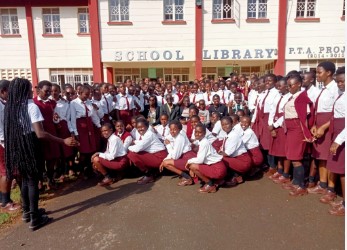The Kenyan government has officially apologized to Butere Girls High School students after they were tear-gassed during the National Drama Festival in Nakuru. The incident, which sparked national outrage, left many Kenyans questioning the treatment of students and the freedom of expression in schools.
The apology came from Dennis Itumbi, the Head of Presidential Special Projects and Creative Economy, during a live interview on Citizen TV. His statement marks the first time the government has publicly taken responsibility for the incident.

What Happened in Nakuru?
The drama began when Butere Girls declined to perform their play titled “Echoes of the War.” The students cited poor treatment, lack of support, and the unexpected arrest of their scriptwriter, Cleophas Malala, as reasons for their withdrawal.
Shortly after, police officers reportedly lobbed teargas canisters at the students as they exited the venue. The images and videos that followed went viral on social media, causing a wave of anger and disappointment among Kenyans.
Government Finally Responds
In his interview, Dennis Itumbi acknowledged the government’s role and publicly apologized to the school, students, and parents.
“We deeply regret what happened. I offer a full and sincere apology on behalf of the government,” said Itumbi.
“This should never have happened to young girls who were only there to showcase their talent.”
He also confirmed that the apology carried the full weight of the government, not just his personal view.
Why the Apology Matters
The apology is seen as a step in the right direction. For many, it brings hope that the rights of students will be taken seriously moving forward. Butere Girls High School is one of Kenya’s top institutions, and the incident raised serious concerns about student safety and censorship.
Several parents and education stakeholders had demanded action and accountability after the teargas incident. The apology, while late, shows that the government is listening.
What About the School Principal?
Rumors had circulated online that the principal of Butere Girls was being transferred as punishment for the drama. However, Itumbi clarified this matter.
“The principal is not being punished. She is nearing retirement, and there is no plan to transfer her over this incident,” he said.
This came as a relief to many supporters of the school, who praised the principal for standing by her students.
Echoes of the War – A Bold Play
The play “Echoes of the War” was written to address sensitive political issues, and some believe it was banned due to its content. It was said to tackle topics like corruption, tribal conflict, and political violence—issues that continue to affect Kenya today.
The arrest of former Kakamega Senator Cleophas Malala, who was involved in writing or supporting the script, added fuel to the fire.
Many Kenyans saw this as an attack on creative freedom and the right of young people to express themselves through art.
Public Reaction
Kenyans across the country praised Butere Girls for their courage. Hashtags like #IStandWithButereGirls and #ProtectOurStudents trended on social media.
One Twitter user wrote:
“These girls are brave. They refused to be silenced and stood up for what they believed in. They deserve respect, not teargas!”
Another user added:
“The government must ensure this never happens again. Students are not criminals.”
What Happens Next?
Itumbi promised that the government will take steps to prevent similar incidents in the future. While he did not go into details, he mentioned that remedies would be developed to protect students’ rights during such events.
Education stakeholders are now calling for better communication between schools and the government, especially during national competitions. There is also growing support for introducing policies that safeguard freedom of expression in schools.
Final Thoughts
The Butere Girls High School incident was a sad reminder of how young voices can be silenced. But thanks to public pressure and support, the students have received a long-overdue apology. The government’s acknowledgment is a positive step, but more must be done to ensure this never happens again.
Kenya’s youth are the future, and their right to speak up—whether through art, debate, or performance—should always be protected. Stay tuned in Nairobi Gossip.

